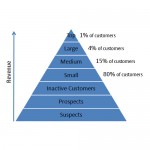
We Like To Like What Others Like – A Different View On The Customer Experience
Managing the Customer Experience is a very hot topic in CRM these days. Assisting customers in traveling an effortless customer journey while investigating and purchasing products and services seems to have become the ultimate goal of many marketing and sales department. The choice for the use of communication channels as well as the level of engagement should be left to the individual customer, and selling companies must do all they can to be flexible and meet any possible customer demand.
From a customer-centric perspective the hype around Customer Experience Management is very relevant and seems to be a move in the right direction. However, there are two big problem with the Customer Experience itself, and that is that (1) customers don’t know how to experience and (2) individual customers do not know how to judge or rate an experience, because in fact they don’t know what they like at all. Let me explain both statements.
Customers don’t know how to experience at all
Last week I watched on television the show of Pharell Williams at the Pinkpop Festival in Holland. For the performed his worldwide hit song “Happy” he brought on stage about 30 kids who didn’t have to do anything but just stand and dance a little, enjoying what I would have guessed to be one of the most exciting experiences in their young lives. They don’t get a chance to stand on a stage in front of 75.000 people every day, do they? And what happened then was one of the most absurd things I have ever seen. Almost all these kids grabbed their mobile phones and started to make pictures or film the audience. And at the same time, at least half of the 75 thousand in the audience also had their smart phones out, filming the filming kids on stage! When I was a kid myself I remember that my parents always joked about the Japanese tourists with their huge cameras, more busy taking pictures than looking around and enjoying the experience of being in another country. “It’s good they take these pictures, so that they can at least see at home what they could have seen here”, my father used to joke. And now, like I saw during this Pharell Williams show, we are all constantly doing exactly like those Japanese tourists did. We don’t know how to look, we don’t know how to scent, hear or feel. And therefore all we do is recording. Creating memories of something that we actually never experienced.
Customers don’t know what they like
Personally I find the fact that apparently most human beings don’t know how to experience quite disturbing. Because if you are not capable of undergoing whatever happens to you, how will you ever be able of judging it. When you don’t know how to feel your emotions will never respond. And actually, I think that we can not only determine that people don’t know how to experience, I dare to say that people don’t know what they like as well. Because, let’s face it, if every individual really had a taste of its own, than why in these times of personalized streaming and on-demand media do we still have stars and hit records. That is because people don’t know what or who to like, but like to like what others like. Their taste is to be influenced to a high degree. Marketing professionals know this for a long time already. People hardly ever have a taste of their own, but like the tastes that they are familiar with. Ask anyone who has worked in the food industry, where artificial and chemical flavors added to standard products like milk and yogurt differ per country.
So if the statements above are true, or at least somewhat true, then Customer Experience Management should be looked at in a completely different way. Then it should not be about listening to the customer and understanding his journey and trying to deliver pleasant experiences, no it should be about influencing the perception of the experience of the masses. Just like adding artificial flavors to milk. Just like marketing departments have been doing for ages…
 Previous Post
Previous Post Next Post
Next Post